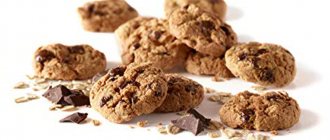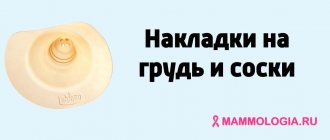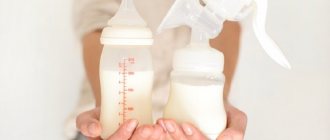Is it possible to take vitamin D during breastfeeding?
Vitamin D belongs to complex substances - prohormones, which are considered precursors of hormones. D2 enters the body with food, and D3 is formed under the influence of sunlight.
Vitamin D includes several active substances:
- ergocalciferol (aka D2);
- cholecalciferol (D3);
- calciferol.
The substance is found in food and is formed under the influence of ultraviolet radiation.
Together they provide:
- metabolic processes in tissues and organs;
- absorption of calcium and phosphorus from food in the duodenum;
- participation in cell reproduction;
- synthesis of certain hormones;
- general strengthening effect;
- energy, vitality.
In 1914, the discovery of a certain active substance in fish oil by biochemist Elmer McCollum finally solved the acute problem of childhood rickets. Veterinarian Edward Mellenby found that dogs that are supplemented with fish oil do not suffer from rickets. To make sure which substance is such a good disease prevention, in 1922 an experiment was conducted with the same fish oil, from which the previously discovered vitamin A had been previously removed. All dogs that received it were cured of rickets. At that time, it was the fourth vitamin discovered by science, and it received the name of the fourth letter of the Latin alphabet. It was later proven that the body can produce it independently under the influence of the sun.
We recommend reading: What are the benefits of fish oil in capsules, instructions for use, reviews
Breast milk contains a small amount of vitamin D, but it is enough for the baby. If a child with breastfeeding does not have enough vitamin, it is solely because the mother does not receive it in full. You can take additional vitamin D during breastfeeding only on the recommendation of a doctor, if there are indications. To maintain levels in the body, you will need daily sunbathing for 20 minutes a day and an appropriate diet containing the maximum of nutrients. Such products include:
Recommended reading: Benefits of goat cheese
- fermented milk products - butter and cheese;
- oatmeal;
- parsley and potatoes;
- liver;
- fatty fish;
- caviar;
- meat;
- eggs (yolk);
- some types of mushrooms.
We recommend reading: Potatoes: beneficial properties and contraindications
To speed up absorption, you should include in your diet foods high in phosphorus, calcium and a number of vitamins.
Important! If a mother with breastfeeding receives a sufficient amount of vitamin D from her diet, then it makes no sense to give them additionally.
Experts note that vitamin D can be taken while breastfeeding, but only if necessary.
Doctors' opinion
The opinions of experts regarding the need to take vitamin complexes are ambiguous.
Galina Stepanovna Gireeva, 49 years old, Stavropol
I recommend taking vitamins in the autumn-spring period to support the body of a young mother. When purchasing medications, you should pay attention to the naturalness of the composition. In the summer, it is advisable to ensure a sufficient supply of useful components along with fresh vegetables and fruits.
Ilona Viktorovna Khvashchevskaya, 37 years old, Bobruisk
You need to take synthetic vitamins if you have laboratory-proven vitamin deficiencies. An excess of vitamins is just as dangerous as their deficiency. It is necessary, if possible, to balance your diet, get good sleep and walk a lot, and experience positive emotions.
Is vitamin D passed through breast milk?

Vitamin D is transferred to the baby through mother's milk during breastfeeding
The main source of vitamin D for a newborn is the reserves obtained in the mother's womb. Therefore, it is important to make sure that the mother receives enough doses during pregnancy. The reserves should be sufficient for the first 3-4 months after birth during breastfeeding, even if the baby does not spend much time in the sun. Adding vitamin D to a nursing mother’s food significantly increases its amount in breast milk during breastfeeding. If she does not have a deficiency during breastfeeding, then the milk will always contain the optimal amount of the beneficial substance. This has been confirmed by domestic and foreign experts during many years of research on nursing mothers.
Attention! Breastfed children receive only part of the required amount of vitamin D from their mother's milk, the rest they absorb with the help of sunlight.
It is possible that a number of problems may interfere with the absorption of the vitamin in the mother's body during breastfeeding. For example, being overweight, certain medications, difficulty absorbing fat from food. However, these conditions do not interfere with the transfer of vitamin D from the blood into breast milk when feeding a baby.
Meals by month
So that the mother does not fuss over trifles, Komarovsky recommends drawing up a rough menu for several months in advance, so that after giving birth you can immediately start eating right.
The type of milk a child receives can greatly affect the state of his health, because it is in the first months that the digestive system is formed and “adjusted,” the production of enzymes is established, and the baby’s own immunity begins to form.
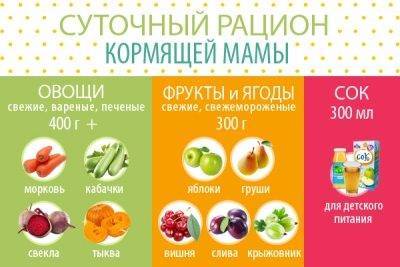
First month
Prohibited are fatty broths, pork, lard, yeast baked goods, pickled and canned foods, whole cow's or goat's milk, cocoa and coffee.
It is best to eat vegetables, both boiled and baked:
- Fruits can be eaten after heat treatment - baked apples are perfect.
- Soups - with lean broth and with broth made from lean beef or chicken breast.
- Every day you need to eat dairy or dairy-free cereals with a moderate amount of butter.
- It is better to replace bread with crackers or biscuits.
- Compotes are very useful.
Second month
Starting from the fifth week of the baby’s life, the mother can gradually introduce into her diet (in small portions) lean meat in boiled, stewed or baked form, as well as sea fish, quail and chicken eggs prepared in similar ways. Yeast bread, chocolate, alcohol, and carbonated drinks remain prohibited.

Third month
During this period, mother can gradually begin to eat soups with fatty broths. It's time to cook borscht and cabbage soup, but you shouldn't be too zealous with cabbage, add less of it.
With tea, the mother can eat jam and jam in small quantities; if the mother herself is not allergic, then a small amount of high-quality fresh honey is acceptable.
You can add vegetable salads to the menu, as well as fresh fruits, excluding citrus fruits. Mom can already afford a small amount of pasta.
Fourth month
Baking and bread made from yeast dough, full-fat cow's milk, hot seasonings, spices, garlic, chocolate and cocoa are still prohibited. But the diet can be expanded a little by adding fresh herbs, a small amount of onions and sugar (very moderately!) to everything you can already eat.
Fifth month
You can now eat baked goods, but only unleavened and homemade ones, such as cookies. You can now add a small amount of spices to your mother’s soup. You can also eat steamed cutlets.

Sixth month
Mom can safely add fried minced fish cutlets to the permitted products; by the end of the sixth month, you can also make chicken breast cutlets.
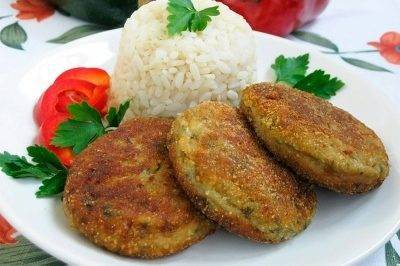
After six months
Legumes, which were previously prohibited, and fatty meats (pork and lamb) can be introduced into the diet in small quantities. This does not mean that you can already eat lard and snack on garlic.
Pork should be cooked without frying in oil, it is better if it is stewed.
Mom can now eat seafood.

Beneficial properties of vitamin D for nursing
After childbirth, especially in those women who breastfeed their baby, their reserves of nutrients and energy are depleted. It is during the feeding period that doctors recommend introducing microelements and active substances into the diet. Taking vitamin D during breastfeeding is important, as it affects all basic life processes. In addition to strengthening and restorative properties, vitamin D has a number of effects on mothers during breastfeeding:
- immune support;
- prevention of oncology, sclerosis, diabetes mellitus, some pathological processes in the joints;
- slowing down the aging process, improving the condition of skin and hair, tissue regeneration;
- positive effect on the functioning of the pancreas, thyroid gland, visual organs, and nervous system;
- strengthening the skeleton, teeth, nails;
- normalization of metabolic processes, metabolism during breastfeeding.
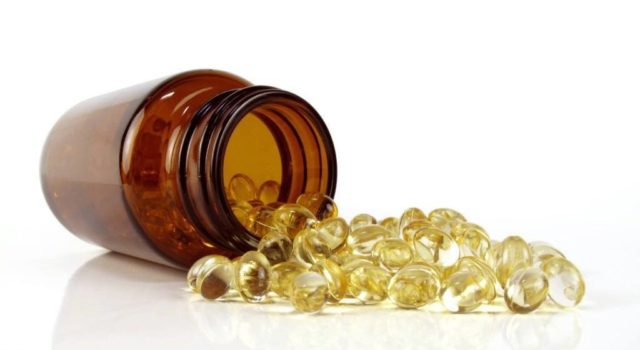
The drug should be taken strictly according to instructions
However, the main function of vitamin D during breastfeeding is the prevention of rickets in newborns. It can be recognized by the deformation of the baby’s bones, excessive sweating, baldness, and muscle weakness. It is worth noting that the disease slows down the development of the entire organism as a whole.
What are the benefits of ascorbic acid?
- participates in the formation of intracellular collagen;
- strengthens the health, structure of teeth, bones and capillary walls;
- speeds up metabolism;
- has a positive effect on the metabolism of carbohydrates, iron and tyrosine;
- participates in the synthesis of lipids and proteins, as well as the processes of cellular respiration;
- reduces the need for other vitamins (vitamins B, A and E);
- increases the body's resistance to diseases;
- has strong antioxidant properties.
On a note. We must not forget that our appearance also depends on vitamin C. Its deficiency has a bad effect on the skin, hair, nails and figure. But a young mother definitely needs to be not only healthy, but also beautiful.
Indications for the use of vitamin D in breastfeeding mothers
When breastfeeding, the mother's nutrients are used to enrich the milk, so the woman will need additional vitamin D for her own body's needs. Taking the drug is indicated:
- when childbirth and the period of initiation of breastfeeding occurred in winter and early spring;
- with constant stress and emotional stress;
- mother and child living in regions with insufficient solar activity;
- lack of breast milk during natural feeding;
- pathology of the skin, nails and excessive tooth decay in the mother;
- mother's restriction during breastfeeding in many foods due to allergies in the child.
If a woman does not have such health problems, it is enough for her to adhere to a proper diet and monitor her health, especially during breastfeeding.
Warning! It must be remembered that active substances can cause harm. Too much can be even more dangerous than too little. This manifests itself as an allergic reaction, intoxication of the body, and liver dysfunction.
Macronutrient Impact on Overall Health
First of all, calcium is necessary to strengthen tooth enamel, bones and joints.
Compared to other mineral elements contained in the body, calcium ranks 5th. Its total mass in the human body is 1–2.2 kg. This is the main building material for the child’s bone tissue and teeth. During age-related changes, the mineral is responsible for maintaining skeletal density and preventing the development of osteoporosis. In addition to its main functions, it is important for the functioning of the cardiovascular and nervous systems. Other beneficial properties of calcium include the following:
- reduction of allergic reaction;
- strengthening the walls of veins and arteries;
- normalization of blood clotting;
- stabilization of muscle tone;
- removal of heavy metals;
- improvement of nerve cell conductivity;
- beneficial effects on the functioning of the pancreas and thyroid glands;
- reducing the production of bad cholesterol;
- prevention of thrombosis formation;
- relieving fatigue during the lactation period;
- decrease in blood pressure.
Dosage of vitamin D3 for breastfeeding
A deficiency of D3 (cholecalciferol) is observed in those women who live in regions with short summers, where there are few sunny days a year. The need for it increases sharply during breastfeeding. The correct dose of D3 will help reduce the threat of various diseases during breastfeeding.
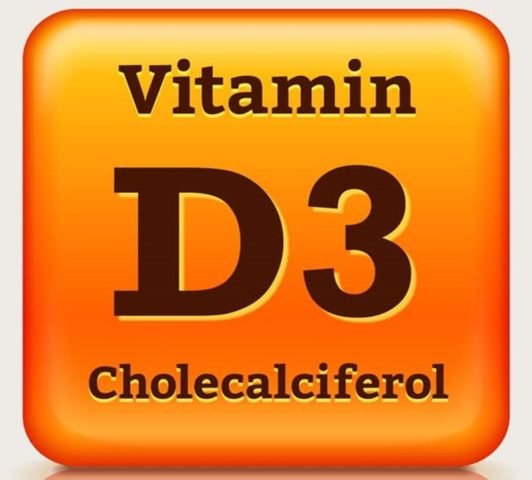
D3 has another name - cholecalciferol
It is noted that at different periods of a woman’s life and physiological state, including during breastfeeding, it is necessary to take different doses of the drug. For example, for young people it is enough to take 400 IU per day. Pregnant women and mothers who are breastfeeding need 500-600 IU per day, because most of the nutrients are transferred to the baby through milk. D3 drugs and dosage for hepatitis B should be prescribed by a doctor, otherwise an excess can be harmful.
Opinions of people who took the drug
Reviews from patients who use this medicine:
Alina, 28 years old
Evgeniya, 34 years old
Such a wonderful tool! And the cost is very small. This is the same calcium that we see advertised on TV and that is sold in pharmacies at a high price. I buy regular calcium gluconate, and I’m absolutely satisfied with everything. Specifically, I noticed the following improvements in my condition:
- My hair began to fall out significantly less after I started taking this medication. Previously, the situation was much worse. My hair kept falling out no matter what I did. Now I am very pleased with their condition.
- When the weather changed, the joints in my knees often hurt. And it passed. Now, in any weather, I am in a good mood and feel great. Probably, after all, my body lacked the necessary beneficial elements.
- The condition of the nails has improved - they have become smooth, even, strong, and have stopped peeling and crumbling.
- General health has improved. I want to move more and enjoy life.
Svetlana, 33 years old
I am fighting herpes on my lips with this drug. The cause of the disease is a weakened immune system or, possibly, stressful situations. I decided to start using calcium gluconate for treatment and have no regrets. The drug was taken 3 times a day, 1 tablet. Herpes, which used to disappear in about a week, now cleared up in 3 days. Just in case, I treated it for two weeks, after which herpes has not bothered me for a long time.
Evgeniya, 29 years old
The medicine can be given even to small children under 1 year of age. This microelement is very useful for the child's body.
I myself also take calcium to prevent allergies, since I used to constantly suffer from seasonal allergies, especially during the July poplar fluff period, I think many will understand me. The symptoms are quite unpleasant - watery eyes, sneezing, red nose. I feel much better now.
Many people advise taking the pill with milk; it is believed that this way the medicine is absorbed much better.
You can also take vitamin D together with this remedy; on sunny days you can get vitamin D outside.
The drug can also be taken to prevent allergies, but, in any case, before using the drug it would not be superfluous to seek advice from your doctor.
Ekaterina, 37 years old
How to take vitamin D while breastfeeding mother
You should not decide to take funds on your own, especially during breastfeeding. In this regard, it is necessary to consult a specialist. Before use, you should read the instructions. In no case should you exceed a certain dosage for breastfeeding. It is important to carefully monitor the body during the first days of use in order to prevent individual intolerance to some components of the drug. In addition, the active substances should be taken in a course, following all the instructions of the manufacturer and the attending physician.
Contraindications and side effects
Contraindication is personal intolerance or hypersensitivity to the drug. An excess of acid has a bad effect on the digestive system, so when consuming you need to strictly follow the recommended dose.
Possible side effects:
- nausea and vomiting, cramps;
- headache, insomnia, feeling tired;
- allergic skin reactions;
- formation of kidney stones;
- burning and itching in the vagina, increased amount of discharge, swelling;
- increase in body temperature.
The acid is water-soluble, so in case of an overdose, it will simply be eliminated from the body after some time. But this does not mean that side effects can be avoided. It is better not to risk either yourself or the baby’s health and not use the supplement in large quantities.
